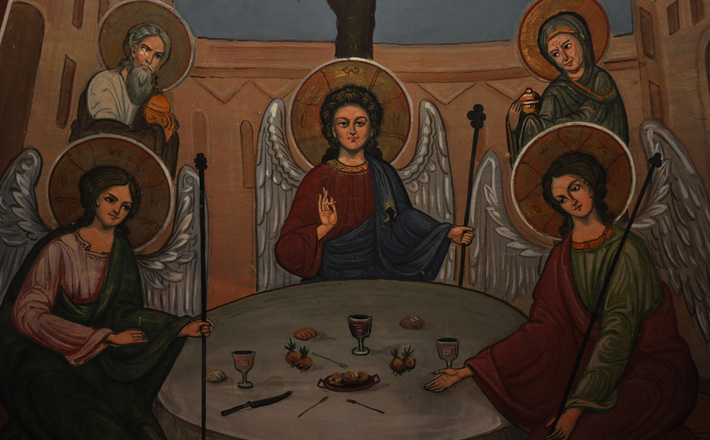Commentary on Proverbs 8:1-4, 22-31
What is the connection between wisdom and joy?
In the text appointed for today, Wisdom is personified as female, and in her humanity finds all knowledge, insight, and truth. Wisdom is also portrayed as delighting God and in human beings. How we are to interpret this portrayal, often referred to as “Lady Wisdom” or “Woman Wisdom,” is among the most hotly contested issues of interpretation in the book of Proverbs, especially with regard to verses 22-31, the latter portion of today’s text.
In particular, the question of the relationship between Yahweh and Woman Wisdom is significant here: is Wisdom God’s laborer, an attribute of God, or God’s partner in creation? As it turns out, the relationship between Wisdom and God is also about the delighted relationship between God and humanity.
The text opens with Wisdom calling out to all people from the places of human interaction and discourse. She calls from the centers of economic and juridical exchange (the “crossroads” and the “gates” in verses 2-3), as well as from the ordinary spaces of societal life (“On the height, beside the way” in verse 1). Wisdom cries out to “all that live” (verse 4), for the “simple” to receive instruction (verse 5), and for rulers to “govern rightly” (verse 16). Thus Wisdom is a prophetess, a preacher, who stands amidst the people and demands attention. She does not work quietly, behind the scenes, but she is to be the guiding force in all-human affairs.
A “definition” of Wisdom here is necessarily multiple, reflecting the vibrancy of Wisdom in the many aspects of human life. Looking beyond the appointed text for today, verses 5-21 provide us with a picture of this multiplicity. Wisdom is, of course, centrally concerned with knowledge, in its many forms. Prudence, intelligence, truth, instruction, discretion, insight (verses 5-14) — Wisdom is all knowledge, and she is the ability and the power to discern the proper exercise of knowledge. As noted above, it is by Wisdom that rulers govern (verses 15-16).
For all people, Wisdom is the most valuable of possessions, and she bestows wealth on those who love her (verses 18-19). Finally, and significantly, Wisdom walks “in the way of righteousness, along the paths of justice” (verse 20), guiding human affairs in the right direction. Indeed, the very purpose of knowledge, insight, and discretion is to lead people into the right ordering of just society.
The final portion of the lectionary text, verses 22-31, is a striking passage that describes the indispensable role of Wisdom in creation, and the infusing of Wisdom throughout the created order. Wisdom, she proclaims, was created at the beginning of Yahweh’s work, “the first of his acts long ago” (verse 22). The language of verses 23-29 echoes that of the creation narrative of Genesis 1. Wisdom is “set up before the beginning of the earth,” “brought forth” from the depths, before God created the springs, the mountains, and the fields.
Even more significantly, Wisdom proclaims her presence at the creation: when Yahweh established the heavens, “drew a circle on the face of the deep” that separated the seas from the skies, “marked out the foundations of the earth,” Wisdom was there. These echoes of Genesis 1 establish Wisdom as the ordering principle of creation, by which God proscribes the boundaries of created things (verse 29), embedding Wisdom into the very creation.
The final two verses of the passage are the most crucial for understanding not only the relationship between God and Wisdom, but also that between God and that which God creates, especially human beings. In verse 30, Wisdom describes herself as beside God at creation, either, depending on the translation, “like a master worker” or “like a little child.” The former translation is in keeping with a depiction of Wisdom as God’s helpmeet in creation, a craftsperson who assists God in the formation of the world. The latter translation reflects the delight that God takes in Wisdom, and that Wisdom takes in humanity in verses 30 and 31.
The ambiguity of the translation, I believe, allows both understandings to operate together, depicting Wisdom as the formative power of God’s delight. As Elizabeth A. Johnson writes of this text, Wisdom “is a beneficent, right-ordering power in whom God delights and by whom God creates; her constant effort is to lure human beings into life.”[1] Wisdom is the creative power of God that is embedded in the world; each created thing, and the creation as a whole, speaks of the Wisdom of God at its foundation.
That Wisdom is God’s very delight. It is by the power of delight that God brought forth the world, and Proverbs 8 tells us that God delights in particular in humanity. God’s delight is the power that drives God to create, forming all that is through the ordering power of divine joy. Human life, guided by God’s Wisdom in the ways of righteousness, is God’s special delight; Wisdom draws human beings into delighted relationship with the divine.
[1] Elizabeth A. Johnson, She Who Is: The Mystery of God in Feminist in Theological Discourse (New York: The Crossroad Publishing Company, 1996), 88.


May 26, 2013